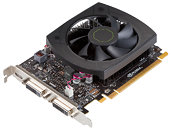Thursday, March 14th 2013

NVIDIA Working on Faster GeForce GTX 650 Ti
In an attempt to avert the threat posed by the upcoming AMD Radeon HD 7790 "Bonaire," NVIDIA is reportedly changing the specifications of its current GeForce GTX 650 Ti. The company could increase reference clock speeds of its current GTX 650 Ti, without tinkering with physical specifications such as CUDA core count (of 768) or memory bus width of 128-bit. The GTX 650 Ti currently features reference clock speeds of 925 MHz core, and 1350 MHz (5.40 GHz GDDR5-effective) memory. The rehashed GTX 650 Ti could be released towards the end of March, or early-April.
Source:
SweClockers

44 Comments on NVIDIA Working on Faster GeForce GTX 650 Ti
Given that Kyle and Co specialize in 2560x1600 testing + MSAA/SSAA, I'm not overly surprised that the 660 Ti's lack of stock bandwidth couldn't be exploited by comparison.
for the... less 'mainstream' countries, i also wonder if it's just a worse distribution chain, less stock, less customers, maybe import from other stores to resell
well even in noth america there are plenty of stores that jack up the price, or worse, pretend something is on sale (tigerdirect recently did geforce titan at $1,250 or so)
I already own a GTX 650 Ti GS OC model so meh, and we still have no idea how the 7790 will perform yet do we?
For example since Hong Kong enjoy very low tax rates, and no sales tax hardware prices are quite very good here.
This also have to do how close we are to mainland China.
While I'd say don't discount bandwidth... Have a look at this synopsis from XbitLabs. They show that a Gigabyte with memory OC’d at 7160Mhz and a Zotac AMP at 6200Mhz. Comparing very close core clocks 1078Mhz Gigabyte and 1072Mhz/5400mhz of the EVGA the Gigabyte is 8% faster. While Zotac vs. (stock) Gigabyte are both 1033Mhz core clock; the 5400Mhz memory on the Gigabyte against the Zotac at 6200Mhz memory, there's again almost another 8% improvement. Also, look at the 4xAA/AF16x between the EVGA and OC Gigabyte there's 10% differance. I think that's what Nvidia is hanging there hopes on.
www.xbitlabs.com/picture/?src=/images/graphics/geforce-gtx-650-ti-roundup/zfulltable.png
•Retail: GeForce GTX 650 Ti Boost
•GPU: GK106
•Cores: 768
•Base Clock: 980MHz
•Boost Clock: 1030MHz
•Memory Interface: 192-bit
•Memory Clock: 1500MHz QDR (6 billion transfers per second)
•Memory Bandwidth: 144.000 MB/s, 140.63GB/s
Ok now we wait to se if the run with the longer GTX660 PCB, I think they will. Appear they aren't seeing as many "Top-Shelf 768" as I would have thought. How cost effective can this be?
If the latter is the case, then it would stand to reason that dual fan (and longer PCB) designs would dominate from vendors...but then the longer PCB is exactly how it stands now. Not maxing out the clocks also allows vendors to market overclocked models of the "new card".
BTW: The present 650 Ti size approximates that of the HD 7750/7770/7850, and I'm pretty certain that the Nvidia based cards from the vendors don't carry a higher BoM than Radeons...so why point out cost effectiveness ? or is the lack of cost effectiveness to the end user? Don't you need pricing to complete that equation ?
/Someone should tell BSN that I was joking when I suggested using the name GTX 650 Ti Boost (in post #23)
EDIT: missed the addition 192 bit bus.
But for some reason, prices for Gigabyte and ASUS cards are inflated and yet cards from Sapphire are seem to be priced better.
www.pccasegear.com/index.php?main_page=product_info&cPath=193_1387&products_id=22168
www.pccasegear.com/index.php?main_page=product_info&cPath=193_1387&products_id=20330
www.pccasegear.com/index.php?main_page=product_info&cPath=193_1387&products_id=21726
www.pccasegear.com/index.php?main_page=product_info&cPath=193_1387&products_id=20776
Cheapest one > www.pccasegear.com/index.php?main_page=product_info&cPath=193_1387&products_id=21156